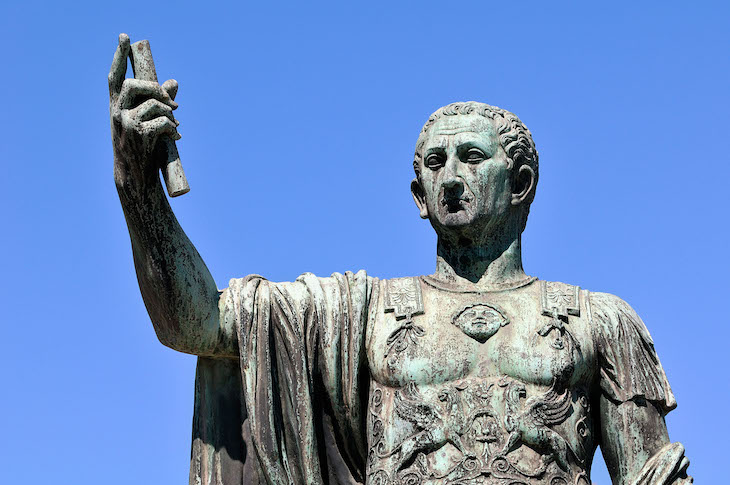‘Apart from the sanitation, the medicine, education, wine, public order, irrigation, roads, a fresh water system, and public health, what have the Romans ever done for us?’, asks the leader of the People’s Front of Judea in Monty Python’s 1979 film Life of Brian.
The appearance on the left (sinister) side was considered an ill omen, hence our modern word ‘sinister’
We, too, might think of the Rome’s legacy largely in terms of infrastructure projects such as roads, sewers and public baths. But there’s an even more obvious and ubiquitous bequest: the words we speak and the context and concepts that gave birth to them. Almost a third of English vocabulary derives directly from Latin. Add the Latin words that entered English through French, and nearly 60 per cent of our vocabulary traces back to Ancient Rome.
Peering into their etymologies reveals how English words still carry Roman life inside them like miniature time-capsules of ancient religions, maths, myths and, particularly, politics. Senate, candidate, inaugurate, election: it’s hardly surprising that the Romans left a deep imprint on our political language, given how many modern institutions and ideals of government descend from theirs. The word senate, for instance, comes from senex, ‘old man’ (likewise the root of ‘senior’ and ‘senile’), reflecting how, according to Roman tradition, Romulus, Rome’s legendary first king (traditional date 753 BC), established the original Senate as an advisory body consisting of 100 members. All were retired soldiers, grey heads over the age of 60 – something of a feat of longevity given that life expectancy was only about 50.
A Roman got himself elected to political office by becoming what we now call a candidate. The word comes from candidatus, ‘whitened’, a reference to the pristine white toga the aspiring politician donned while addressing an assembly. He also embarked on an ambitio, a gladhanding walkabout whose name, coming from ambulare (‘to walk’), is the root of ‘amble’ and ‘ambulatory’. However, eagerly perambulating through the Roman Forum meant a man might be seen as currying favour too assiduously and therefore come to be regarded as ambitiosus, from which, of course, we get ‘ambitious’. For the Romans, ambition was largely a negative trait: Cicero laments political actors who are nimis ambitiosus (too ambitious). For us, however, in the age of ‘self-starters’, ‘growth mindsets’ and aggressive networking over LinkedIn and flat whites, the connotations are no doubt more positive.
One of the most important offices in Rome was that of censor (from censere, ‘to assess or estimate’): a magistrate who conducted the census, assessed citizens’ morals, and could remove senators deemed unworthy of office because of debt or moral turpitude. Every five years, the two censors held a lectio senatus, a ‘reading out’ of senators’ names. Lectio comes from legere (‘to read, to choose’), the same root from which we get ‘legible’, ‘lecture’ and ‘election’. The connection between electing and reading wasn’t arbitrary: reading originally meant picking out letters or words from a text – just as, in the lectio senatus, the senators’ names were selected and read out. Anyone whose name was passed over in silence became a praeteritus. The word never became naturalised into English in a political context, though the concept perhaps survives in politicians taking ‘gardening leave’ or choosing to ‘spend more time with their family’.
For all their military prowess and granite self-belief in their destiny, the Romans were a superstitious lot. These masters of the known world would take fright if an owl hooted at noon or someone sneezed at the wrong moment. One group that always had its say in Roman public life was therefore the gods, urgently consulted before priests were appointed or the ground broken for temples or other sacred spaces. The consultation involved a priest known as the augur dividing the sky (or sometimes a patch of ground) into sections (a measured, bounded area known as the templum – from which we get ‘temple’) and keenly watching for the flight of birds. Augur comes from avis, ‘bird’, and the title was originally auspex (from avis + specere, ‘to watch’) – in effect, ‘bird-watcher’. This divine twitcher sought to judge from the timing and flight of birds whether the gods approved of the proposed course of action. The appearance on the left (sinister) side was considered an ill omen, hence our word ‘sinister’. If on the other hand the arrival of the birds was deemed auspicious (from auspex, obviously) the person under scrutiny would be inauguratus (inaugurated) in an inauguratio.
Our inheritance from Rome extends far beyond simply the words for ceremonies and institutions. We have also absorbed the moral language through which the Romans themselves debated politics – using the vocabulary of auctoritas, dignitas, virtus, gloria and libertas – at a time when public service, political achievement and moral virtue were all intertwined. That so much of our political language descends from Latin is no mere accident of etymology, but a measure of Rome’s enduring intellectual and political legacy. In our discourse of power and ambition, we continue to think and speak within the imaginative boundaries first drawn in the Roman Republic. That’s one more thing – and one of the most important – that the Romans did for us.







Comments